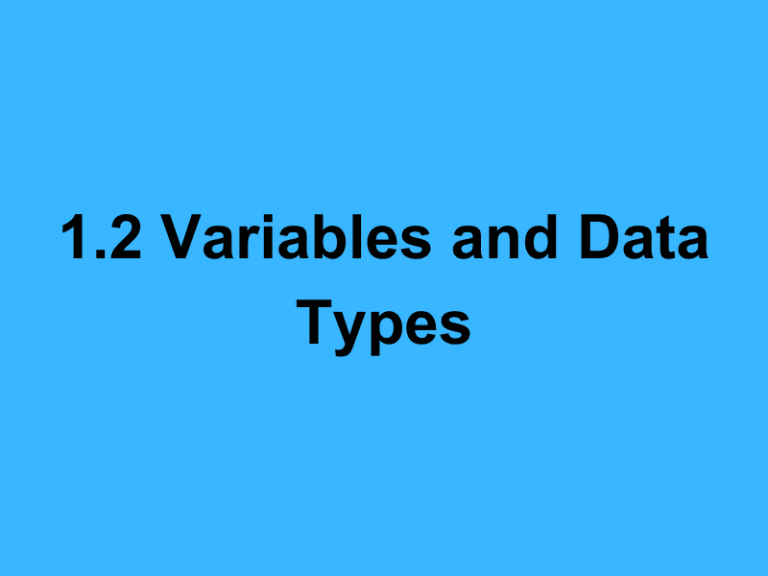In programming, variables and data types are fundamental concepts that store and manage data within a program. Let’s explore these concepts, focusing on Java as our programming language, which is widely used in education, such as in AP Computer Science courses.
1. Variables
A variable in programming is a named location in memory that holds a value. This value can change as the program runs, which is why it’s called a “variable.” Variables are essential because they allow programmers to store data that can be manipulated and retrieved throughout the program.
Declaring Variables in Java
To use a variable in Java, you must declare it by specifying its data type followed by its name. You can also initialize a variable by assigning it an initial value in the same statement.
int age = 30; // Declaration and initialization of an integer variable
String name = "Alice"; // Declaration and initialization of a String variable
2. Data Types
Data types specify the kind of data a variable can hold, such as integers, decimals, characters, or sequences of characters. Java is a statically-typed language, which means you must declare a variable’s type before using it.
Primitive Data Types in Java
Java has eight primitive data types that represent simple values. They are not objects and have no methods.
- byte: An 8-bit integer. Range: -128 to 127.
- short: A 16-bit integer. Range: -32,768 to 32,767.
- int: A 32-bit integer. Range: -2^31 to 2^31-1.
- long: A 64-bit integer. Range: -2^63 to 2^63-1.
- float: A single-precision 32-bit IEEE 754 floating point.
- double: A double-precision 64-bit IEEE 754 floating point.
- boolean: Represents one bit of information, true or false.
- char: A single 16-bit Unicode character.
Non-Primitive Data Types (Reference Types)
Non-primitive data types, or reference types, include class types, interface types, and array types. They refer to objects and can hold any type of data. A reference variable is used to access an object by referring to its memory location.
String greeting = "Hello, World!"; // String is a reference type
int[] numbers = {1, 2, 3}; // Array of integers, also a reference type
Variable Naming Conventions
Java has conventions for naming variables, such as:
- Start with a lowercase letter and use camelCase for multiple words (e.g.,
studentName). - Variable names should be descriptive, indicating the purpose of the variable.
- Avoid using Java reserved words (e.g.,
int,class).
Understanding variables and data types is crucial for programming, as they form the basis of data manipulation and storage in any software application. In educational settings like AP Computer Science, grasping these concepts allows students to build a strong foundation in programming logic and problem-solving.
Frequently Asked Questions about Variables and Data Types
The **Data Type** defines *what kind* of data that variable can hold and what operations can be performed on it. It determines the size the variable occupies in memory and how the computer interprets the binary data stored there.
So, a variable is the *container*, and the data type specifies the *type* of content that can go into the container (e.g., whole numbers, text, true/false values).
- The **kind of values** it can hold (e.g., integers, floating-point numbers, characters, boolean values).
- The **range of possible values** (especially for numerical types).
- The **amount of memory** the variable will occupy.
- The **operations** that can be performed on the variable (e.g., you can add numbers but not typically text strings directly, though some languages overload operators).
- The **name** of the variable itself.
- The variable's **purpose** or meaning in the program logic.
- The **scope** of the variable (where in the code it can be accessed).
- **String/Text types:** (e.g., `String` in Java, `str` in Python) store sequences of characters like words, sentences, or names.
- **Boolean types:** (e.g., `boolean` in Java, `bool` in Python) store only two values: true or false.
- **Character types:** (e.g., `char` in Java) store a single character.
- **Date/Time types:** Store dates, times, or timestamps.
- Complex or Collection types like **Arrays**, **Lists**, **Objects**, or **Dictionaries** can store various types of data, including non-numerical data.
- **Statically-typed languages** (like Java, C++) require you to explicitly declare the data type of a variable before using it, and the type is checked at compile time.
- **Dynamically-typed languages** (like Python, JavaScript) often allow you to declare a variable without specifying its type, and the type is determined (and can change) at runtime.
- In **Python**, you can use the built-in `type()` function. For example:
print(type(my_variable)) - In **Java**, since it's statically-typed, the data type is declared when the variable is created. You know its type from the declaration (e.g.,
int myNumber = 10;- the type is `int`). For objects, you can use `instanceof` to check if an object is an instance of a specific class or interface, or `object.getClass().getName()` to get the runtime class name. - In **JavaScript**, you can use the `typeof` operator. For example:
console.log(typeof myVariable);

